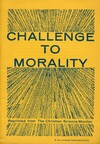

Are you sure?
This bookmark will be removed from all folders and any saved notes will be permanently removed.
Literature
Originally published in the March 15, 1963 issue of The Christian Science Monitor
The challenge to morality in literature has two faces. One of them, a classic profile, represents the timeless role of literature in society. The other, wearing a haunted frown, represents the special characteristics of our time, an age that is not sure it knows what is good and what is bad.
These two faces confront both writers and readers with tests of various moral qualities, from courage to justice to chastity. But in literature one moral quality underlies all the rest. It is honesty. Literature is a form of communication, and in any form of communication the most important thing to achieve—and often the most difficult—is honesty.
As a repository of experience, literature challenges the writer not to falsify experience. It challenges the reader not to demand falsifications in support of his prejudices.
Enjoy 1 free Sentinel article or audio program each month, including content from 1898 to today.
JSH Collections
This article is included in:
1963 - PAMPHLET
Challenge to morality
JSH-Online has hundreds of pamphlets, anthologies, and special editions for you to discover.


